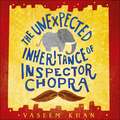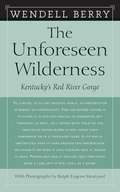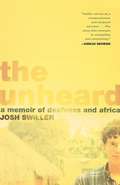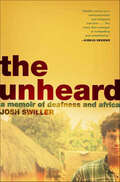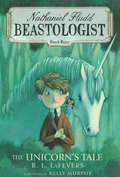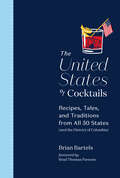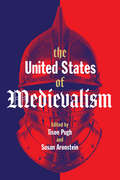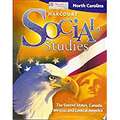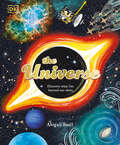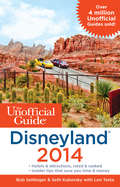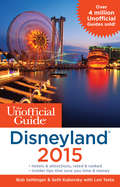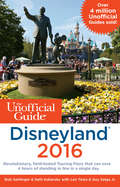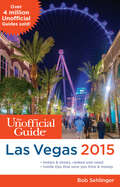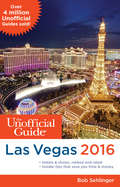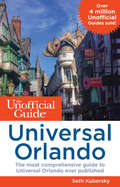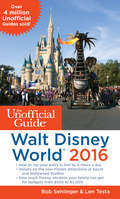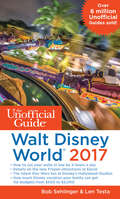- Table View
- List View
The Unexpected Inheritance of Inspector Chopra: Baby Ganesh Agency Book 1 (Baby Ganesh series)
by Vaseem KhanMumbai, murder and a baby elephant combine in a charming, joyful mystery for fans of Alexander McCall Smith and Harold Fry. On the day he retires, Inspector Ashwin Chopra inherits two unexpected mysteries.The first is the case of a drowned boy, whose suspicious death no one seems to want solved.And the second is a baby elephant.As his search for clues takes him across the teeming city of Mumbai, from its grand high rises to its sprawling slums and deep into its murky underworld, Chopra begins to suspect that there may be a great deal more to both his last case and his new ward than he thought.And he soon learns that when the going gets tough, a determined elephant may be exactly what an honest man needs...(P)2015 Hodder & Stoughton
The Unforeseen Wilderness: Kentucky's Red River Gorge
by Wendell BerryThis book represents two visions among many that ultimately saved Kentucky's Red River Gorge from destruction. Located near the western edge of the Cumberland Plateau and home to approximately 26,000 acres of untamed river, rock formations, historical sites, unusual vegetation and wildlife, the Gorge very nearly fell victim to a man-made lake thirty years ago. Outraged and profoundly saddened by the impending loss, Wendell Berry and Ralph Eugene Meatyard set out to preserve their experiences of this unique and beautiful place. Berry's essays, accompanied by Meatyard's arresting photos, offer an intimate portrait of extraordinary natural beauty. Fortunately not an epitaph to one place, "The Unforeseen Wilderness" remains a compelling homage to wild places everywhere.
The Unheard: A Memoir of Deafness and Africa
by Josh SwillerSwiller spent his early years in frustrated limbo on the sidelines of the hearing world. So he decided to abandon the well-trodden path after college, setting out to find a place so far removed that his deafness would become irrelevant.
The Unheard: A Memoir of Deafness and Africa
by Josh SwillerA young man's quest to reconcile his deafness in an unforgiving world leads to a remarkable sojourn in a remote African village that pulsates with beauty and violence These are hearing aids. They take the sounds of the world and amplify them." Josh Swiller recited this speech to himself on the day he arrived in Mununga, a dusty village on the shores of Lake Mweru. Deaf since a young age, Swiller spent his formative years in frustrated limbo on the sidelines of the hearing world, encouraged by his family to use lipreading and the strident approximations of hearing aids to blend in. It didn't work. So he decided to ditch the well-trodden path after college, setting out to find a place so far removed that his deafness would become irrelevant.That place turned out to be Zambia, where Swiller worked as a Peace Corps volunteer for two years. There he would encounter a world where violence, disease, and poverty were the mundane facts of life. But despite the culture shock, Swiller finally commanded attention—everyone always listened carefully to the white man, even if they didn't always follow his instruction. Spending his days working in the health clinic with Augustine Jere, a chubby, world-weary chess aficionado and a steadfast friend, Swiller had finally found, he believed, a place where his deafness didn't interfere, a place he could call home. Until, that is, a nightmarish incident blasted away his newfound convictions.At once a poignant account of friendship through adversity, a hilarious comedy of errors, and a gripping narrative of escalating violence, The Unheard is an unforgettable story from a noteworthy new talent.
The Unicorn's Tale (Nathaniel Fludd, Beastologist, Book #4)
by R. L. LaFevers Kelly MurphyIs there no rest for the travel worn and weary? Not if you're Nathaniel Fludd, the world's youngest beastologist-in-training! All Nate really wants is to track down his missing parents, but when a unicorn falls mysteriously ill, Nate's Aunt Phil makes it clear where a beastologist's duty lies: to the beasts. And if taking care of the world's beasts isn't difficult enough, Nate and Aunt Phil must also keep them safe from the villainous Obediah Fludd, who intends to do them harm. With all this taking up every last bit of his energy and time, will Nate ever find the parents he is so absolutely convinced are alive?
The United States of Cocktails: Recipes, Tales, and Traditions from All 50 States (and the District of Columbia)
by Brian Bartels“[Bartels] takes us on a fascinating bar crawl across the country, explaining the history of America’s cocktail and drinking culture along the way.” —Wylie Dufresne, chef and owner of Du’s Donuts The United States of Cocktails is a celebration of the cocktail history of every state in America. After traveling this great nation and sampling many of the drinks on offer, cocktail authority Brian Bartels serves up a book that is equal parts recipe collection, travelogue, historical miscellany, bartender’s manual, and guide to bar culture today—with bar and drink recommendations that are sure to come in handy whether or not you are crossing state lines. Delving into the colorful stories behind the creation of drinks we love, this book includes more than 100 recipes alongside spirited analysis of each state’s unique contributions to cocktail culture. Filled with colorful illustrations, The United States of Cocktails is an opinionated and distinctively designed love letter to the spirits, bars, and people who have created and consumed the iconic drinks that inspire us and satisfy our thirst.“You could hardly ask for a more personable guide than Brian Bartels. He knows the oldest bars, the coolest bars, the can’t-miss bars and the oddest local quaffs in all 50 states, so you’ll never make the mistake of ordering a Whiskey Ditch in Louisiana or search for Allen’s Coffee Flavored Brandy on an Arizona back bar.” —Robert Simonson, author of The Old-Fashioned“Brian Bartels is a spirits traveler extraordinaire and this informative, highly-entertaining book is my new go-to guide for the most social of vices—drinkin’.” —Greg Mottola, director of Superbad, Adventureland, and The Newsroom
The United States of Medievalism
by Tison Pugh and Susan AronsteinThe United States of Medievalism contemplates the desires, dreams, and contradictions inherent in experiencing the Middle Ages in a nation that is so temporally, spatially, and at times politically removed from them. The European Middle Ages have long influenced the national landscape of the United States through the medieval sites that permeate its self-announced republican landscapes and cities. Today, American-built medievalisms continue to shape the nation’s communities, collapsing the binaries between past and present, medieval and modern, European and American. The volume’s chapters visit the nation’s many medieval-inspired spaces, from Sherwood Forest in Texas to California’s San Andreas Fault. Stops are made in New York City’s churches, Boston’s gardens, Philadelphia’s Bryn Athyn Cathedral, Orlando’s Magic Kingdom, Appalachian highways, Minnesota’s Viking Villages, New Orleans’s Mardi Gras, and the Las Vegas Strip. As the editors and their fellow essayists take the reader on this cross-country trip across the United States, they ponder the cultural work done by the nation’s medievalized spaces. In its exploration of a seemingly distant period, this collection challenges the underexamined legacy of medievalism on the western side of the Atlantic. Full of intriguing case studies and reflections, this book is informative reading for anyone interested in the contemporary vestiges of the Middle Ages.
The United States, Canada, Mexico, and Central America
by Michael J. Berson Tyrone C. Howard Cinthia SalinasNIMAC-sourced textbook
The Universe: Discover What Lies Beyond Our Skies (Space Explorers)
by Abigail BeallTake a journey through the solar system and on toward distant clusters of stars with this visually stunning guide to the universe.Beginning with the Big Bang and looking forward to the future of space travel, this book is a fascinating introduction to space for budding stargazers and future astrophysicists. The Universe covers the planets of the solar system, comets, nebulae, the constellations, types of galaxies, space missions, and much more, showcasing amazing astrophotography that brings each topic to life.Beautiful illustrations by artist Dawn Cooper are combined with up-to-date images from NASA and other space agencies to inspire young readers, and info panels, timelines, and diagrams will help demystify the science behind the wonders of space.
The Unofficial Disney Parks Cookbook: From Delicious Dole Whip to Tasty Mickey Pretzels, 100 Magical Disney-Inspired Recipes (Unofficial Cookbook)
by Ashley CraftExperience the magic of the Disney Parks right in your kitchen with these 100, easy and delicious recipes inspired by Walt Disney World!Stroll right down the middle of Main Street USA, journey from Adventureland to Infinity and Beyond at Pixar Pier, and explore every avenue in between to taste the flavors of the Disney Parks…all without leaving your kitchen. With The Unofficial Disney Parks Cookbook you can bring the magic of Disneyland and Walt Disney World snacks and treats right to your home. Recreate favorites like the classic Dole Whip and Mickey Pretzels to new favorites like blue milk from Star Wars land and Jack Jack&’s Cookie Num Nums from Pixar Pier. These 100 recipes inspired by iconic yummies are perfect whether you are a forever Disney fan or just love a good snack. Now you can feel as if you shared a snack with Mickey himself right from the comfort of your own home!
The Unofficial Disney Parks Cookbooks Boxed Set: The Unofficial Disney Parks Cookbook, The Unofficial Disney Parks EPCOT Cookbook, The Unofficial Disney Parks Restaurants Cookbook (Unofficial Cookbook Gift Series)
by Ashley CraftEnjoy all the magic of Disney cooking in one complete set containing The Unofficial Disney Parks Cookbook, The Unofficial Disney Parks EPCOT Cookbook, and The Unofficial Disney Parks Restaurants Cookbook from bestselling author Ashley Craft.The Unofficial Disney Parks Cookbook Boxed Set bring together popular cookbooks from bestselling author Ashley Craft. The collection provides you with delicious recipes to recreate your favorite meals from Walt Disney World and Disneyland right at home. The Unofficial Disney Parks Cookbook: This book features 100 recipes from each of the Disney parks in Florida and California featuring beloved recipes like Mickey Pretzels and Dole Whip. The Unofficial Disney Parks EPCOT Cookbook: This book helps you eat and drink your way around the world with copycat recipes from the pavilions and festivals at Walt Disney World&’s EPCOT. The Unofficial Disney Parks Restaurants Cookbook: With recipes from both Walt Disney World and Disneyland, these recipes will help you explore the table service and quick service restaurants throughout the parks…right from your very own kitchens. This boxed set offers you the ultimate collection of Disney-themed recipes for every meal and occasion.
The Unofficial Disney Parks Drink Recipe Book: From LeFou's Brew to the Jedi Mind Trick, 100+ Magical Disney-Inspired Drinks (Unofficial Cookbook)
by Ashley CraftSkip the crowded bar, coffee shop, and restaurant and bring the magic of Disney&’s drinks right your home with over 100 easy, delicious drink recipes inspired by the Disney Parks.Raise a glass to bringing the magic of Disney straight to your home with The Unofficial Disney Parks Drink Recipe Book. From coffee and tea to milkshakes and slushies to mocktails and cocktails, this book features over 100 of your favorite beverages from the happiest place on Earth. Recipes are taken straight from your favorite restaurants and cafes throughout the Disney Parks and resorts. You&’ll learn to make delicious, unique drinks without waiting in line including: -Coffees and teas, like Frozen Cappuccino from Joffrey&’s and Teddy&’s Tea from Jock Lindsey&’s Hangar Bar -Fruity drinks and slushies like Frozen Sunshine from Beaches and Cream and the Goofy Glacier from Goofy&’s Candy Company -Mocktails and cocktails like the Sparkling No-Jito from the Tambu Lounge or the La Cava Avocado from Mexico in Epcot -And dessert drinks like the Peanut Butter and Jelly Milkshake from 50's Prime Time Café or the Dole Whip Float from Aloha Isle Perfect for Disney fans everywhere who want to experience those familiar flavors right from the comfort of their home, The Unofficial Disney Parks Drink Recipe Book has all the recipes you&’ll need to make luscious libations worthy of the Mouse himself.
The Unofficial Disney Parks EPCOT Cookbook: From School Bread in Norway to Macaron Ice Cream Sandwiches in France, 100 EPCOT-Inspired Recipes for Eating and Drinking Around the World (Unofficial Cookbook Gift Series)
by Ashley CraftBring EPCOT&’s beloved global fare right to your kitchen with this next installment to the bestselling Unofficial Disney Parks Cookbook series.The Honey Chocolate Baklava from Morocco all the way to the Tangerine Kakigōri from Japan, EPCOT arguably has the best food at the Disney Parks. And now, you can bring the delicious snacks, meals, and drinks straight to your own kitchen with The Unofficial Disney Parks EPCOT Cookbook. Featuring 100 recipes from each of the EPCOT Pavilions and festivals, you&’ll learn how to make: -Jumbo Pretzels from Sommerfest in the Germany Pavilion -Fish and Chips from Yorkshire County Fish Shop in the United Kingdom Pavilion -Avocado Margaritas from La Cava del Tequila in the Mexico Pavilion -Macaron Ice Cream Sandwiches from L&’Artisan des Glaces in the France Pavilion -And much more! Perfect for everyone from EPCOT experts who miss those flavors in between trips to Disney fans who have never visited the parks but still want to enjoy the classic worldly flavors, The Unofficial Disney Parks EPCOT Cookbook has all the recipes you&’ll need to make treats worthy of the Mouse himself.
The Unofficial Disney Parks Holidays Cookbook: From Strawberry Red Velvet Whoopie Pies to Christmas Wreath Doughnuts, 100 Magical Dishes Inspired by Disney's Holiday Celebrations and Events (Unofficial Cookbook Gift Series)
by Ashley CraftThe magic of the holidays meets the magic of Disney right in your very own kitchen with these 100 recipes inspired by Walt Disney World and Disneyland&’s hottest holiday celebrations, festivals, and special events all year long.Bring the magic of Disney&’s holiday celebrations straight to your kitchen with The Unofficial Disney Parks Holidays Cookbook! From festivals and holidays to other special events throughout the year, this book features 100 recipes for the best food items Disney&’s annual celebrations have to offer. You&’ll learn to make: -Valentine Swirl Dole Whip from The Tropical Hideaway for Valentine&’s Day -Frozen Apple Cider from ABC Commissary at Halloween -The Patriots Platter at Liberty Tree Tavern for a classic Thanksgiving meal -The Lock Shock and Barrel Sundae from Auntie Gravity&’s at Christmas -And much more! Perfect for everyone from Disney experts who miss those familiar flavors in between trips to fans who have never visited the Parks but still have Mickey&’s Very Merry Christmas Party on their bucket list, The Unofficial Disney Parks Holidays Cookbook has all the recipes you need to make a celebratory dish worthy of the Mouse himself.
The Unofficial Disney Parks Restaurants Cookbook: From Cafe Orleans's Battered & Fried Monte Cristo to Hollywood & Vine's Caramel Monkey Bread, 100 Magical Dishes from the Best Disney Dining Destinations (Unofficial Cookbook Gift Series)
by Ashley CraftSkip the reservation and bring the magic of Disney&’s restaurants straight to your kitchen with these 100 recipes inspired by Walt Disney World&’s and Disneyland&’s hottest restaurants.Recreate popular restaurant favorites right in your own home from appetizers and main dishes to refreshing drinks and popular desserts. The Unofficial Disney Parks Restaurants Cookbook features 100 table service and quick service restaurant favorites to help you make your own Disney-inspired menu. You&’ll learn to make: -Tiffins Signature Bread Service from Tiffins -Fried Chicken Dinner from Plaza Inn -Herb-Salted Pork Tenderloin from Be Our Guest -Chocolate Cake from Satu&’li Canteen -Proton Punch from Pym&’s Tasting Lab -And much more! Perfect for everyone from Disney experts who miss those familiar flavors in between trips to fans who have never visited the Parks but still want to have the full restaurant experience, The Unofficial Disney Parks Restaurants Cookbook has all the recipes you need to make a meal worthy of the Mouse himself.
The Unofficial Dollywood Cookbook: From Frannie's Famous Fried Chicken Sandwiches to Grist Mill Cinnamon Bread, 100 Delicious Dollywood-Inspired Recipes! (Unofficial Cookbook)
by Erin BrowneBring the fun of Dollywood right to your own kitchen with 100 of the most delicious foods from Dollywood and its surrounding parks.From favorite snacks and main dishes to refreshing drinks and popular desserts, Dollywood has some incredible food. And now, you can recreate all of your favorites—and discover some new favorites—with these 100 recipes in The Unofficial Dollywood Cookbook. You&’ll learn to make: -Frannie&’s Famous Fried Chicken Sandwich from Grandstand Café -Meatloaf Stackers from Granny Ogle&’s Ham &‘n&’ Beans -Fruity Pebbles Funnel Cakes from Crossroads Funnel Cakes -And much more! Perfect for everyone from Dollywood super fans who miss those familiar flavors in between trips to fans who have never visited but still want to experience the amazing food, The Unofficial Dollywood Cookbook has all the recipes you&’ll need to make treats worthy of Dolly Parton herself.
The Unofficial Guide to Disneyland 2014
by Bob Sehlinger Len Testa Seth KuberskyA great destination and thorough preparation are what make a wonderful vacation, and The Unofficial Guide to Disneyland makes Disneyland one of the most accessible theme parks in the world. With advice that is direct, prescriptive, and detailed, it takes the guesswork out of the reader's vacation. Whether they are at Disneyland for a day or a week, there is a plan for any group or family. They can enjoy the rides, activities, and entertainment instead of spending their time in lines.Comprehensive information is presented in a way that permits easy comparisons and that facilitates decision making. There are detailed plans and profiles of hotels, restaurants, and attractions that are presented in "at-a-glance" formats that provide for near instant communication of the most salient information. Profiles are supplemented by indexes. In short, we've got a plan for every reader.The Unofficial Guide to Disneyland's research team is a multi-disciplinary group consisting, among others, of data collectors, computer scientists, statisticians, and psychologists. Their singular goal is to provide a guide that will let you get it right the first time and every time. With their help, advice, and touring plans the reader will have a one-up on anyone else not using The Unofficial Guide to Disneyland. The book is the key to planning a perfect vacation in a great destination location.
The Unofficial Guide to Disneyland 2015
by Bob Sehlinger Len Testa Seth KuberskyThe Unofficial Guide to Disneyland by Bob Sehlinger & Seth Kubersky makes Disneyland one of the most accessible theme parks in the world. With advice that is direct, prescriptive, and detailed, it takes the guesswork out of the reader's vacation. Whether they are at Disneyland for a day or a week, there is a plan for any group or family. They can enjoy the entertainment instead of spending their time in lines.Comprehensive information is presented in a way that permits easy comparisons and facilitates decision-making. Detailed plans and profiles of hotels, restaurants, and attractions are presented in "at-a-glance" formats, providing for effortless communication of the most salient information. Profiles are supplemented by indexes. In short, we've got a plan for every reader.The Unofficial Guide to Disneyland's research team is a multi-disciplinary group consisting, among others, of data collectors, computer scientists, statisticians, and psychologists. Their singular goal is to provide a guide that lets you get it right the first time, and every time. With their help, advice, and touring plans, readers have a one-up on anyone else not using The Unofficial Guide to Disneyland. The book is the key to planning a perfect vacation in a great destination location.
The Unofficial Guide to Disneyland 2016
by Bob Sehlinger Len Testa Seth Kubersky Guy Selga Jr.The Unofficial Guide to Disneyland is the most thorough guide for Disneyland that has ever been written. In any given amount of time you'll get 30% more rides, entertainment, and fun.
The Unofficial Guide to Las Vegas 2014
by Bob SehlingerNevada should make The Unofficial Guide to Las Vegas the official guide to Vegas because there is not a better one. With insightful writing, up-to-date reviews of major attractions, and a lot of "local" knowledge, this book has it all. Compiled and written by a team of experienced researchers whose work has been cited by such diverse sources as USA Today and Operations Research Forum, The Unofficial Guide to Las Vegas digs deeper and offers more than can any single author. This is the only guide that explains how Las Vegas works and how to use that knowledge to make every minute and every dollar of your time there count. With advice that is direct, prescriptive, and detailed, it takes out the guesswork. Eclipsing the usual list of choices, it unambiguously rates and ranks everything from hotels, restaurants, and attractions to rental car companies. With The Unofficial Guide to Las Vegas, you know what's available in every category, from the best to the worst. It is the one guide that will put you in the driver's seat.The reader will also find the sections about the history of the town and the chapters on gambling fascinating. Every gambler should be required to read this book cover to cover before they spend a vacation contributing to the casinos all the money that it takes to run all those flashing lights. In truth, The Unofficial Guide to Las Vegas emphasizes how to have fun and understand the crazy environment that is today's Vegas. It's a keeper.
The Unofficial Guide to Las Vegas 2016
by Bob SehlingerThe Unofficial Guide to Las Vegas is indispensable and a tourist's best friend. It is the one guide that explains how Las Vegas works and how to get the most from a visit.
The Unofficial Guide to Universal Orlando
by Seth KuberskyThe Unofficial Guide to Universal Orlando is the first comprehensive Unofficial Guide dedicated to Universal Orlando from the experts behind the best-selling Unofficial Guide series, and is filled with proven tips and touring advice for enjoying the amazing new Wizarding World of Harry Potter.
The Unofficial Guide to Walt Disney World 2016
by Bob Sehlinger Len TestaThe Unofficial Guide to Walt Disney World 2016 is the best source of in-depth reviews, ratings, and details of every aspect of Walt Disney World. From hotels & resorts to dining to rides and venues, this book HAS IT ALL IN ONE PLACE.
The Unofficial Guide to Walt Disney World 2017
by Bob Sehlinger Len TestaCompiled and written by a team of experienced researchers whose work has been cited by such diverse sources as USA Today and Operations Research Forum, The Unofficial Guide to Walt Disney World digs deeper and offers more than any other guide.<P><P> The Unofficial Guide to Walt Disney World explains how Walt Disney World works and how to use that knowledge to make every minute and every dollar of your vacation count. With advice that is direct, prescriptive, and detailed, it takes the guesswork out of travel by unambiguously rating and ranking everything from hotels, restaurants, and attractions to rental car companies.<P> With an Unofficial Guide in hand, and authors Bob Sehlinger and Len Testa as guides, find out what’s available in every category, from best to worst, and use step-by-step detailed plans to help make the most of your time at Walt Disney World.
The Unofficial Guide to Walt Disney World with Kids 2014
by Bob Sehlinger Len Testa Liliane J. OpsomerThe Unofficial Guide to Walt Disney World with Kids is JAM-PACKED with useful tips, great advice, excellent discussion, and practical travel knowledge gleaned from years of Walt Disney World travel experience. It is one of the few guidebooks to Disney World that specifically addresses the needs of kids with, in some cases, research and input from kids.Compiled and written by a team of experienced researchers whose work has been cited by such diverse sources as USA Today and Operations Research Forum, The Unofficial Guide to Walt Disney World with Kids digs deeper and offer more specific information that any other. This is the only guide that explains how to make every minute and every dollar of your vacation count. With advice that is direct, prescriptive, and detailed, it takes the guesswork out of your family vacation. Step-by-step detailed plans allow you to visit Disney World with your children with absolute confidence and peace of mind.Here's a sampling of things you will find in The Unofficial Guide to Walt Disney World with Kids:Comments and tips on Walt Disney World from surveys of more than 10,000 familiesAdvice on how to prepare mentally, physically, and logistically for your ideal Walt Disney World vacationInformation on which attractions frighten kids and whyWhen to go, where to stay, and how to beat the crowdsField-tested touring plans that can save you up to four hours of waiting in line.How to keep your family happy on vacation and how to return home rested and relaxed
